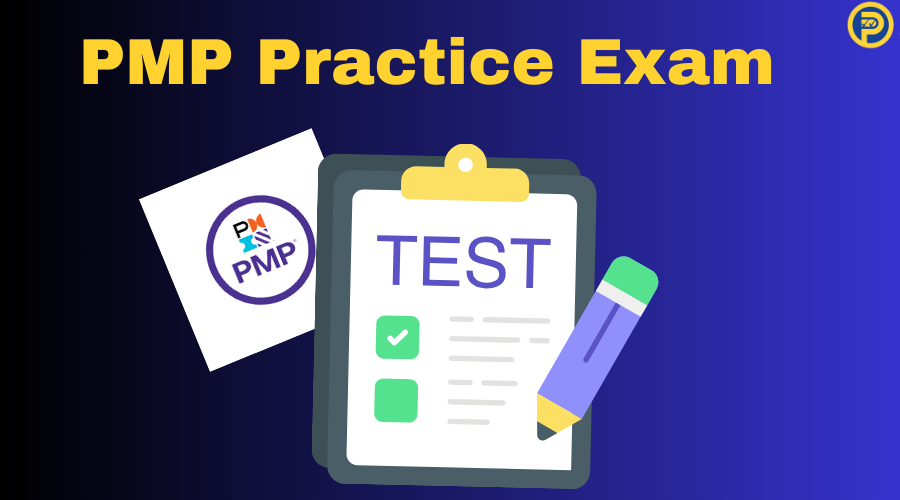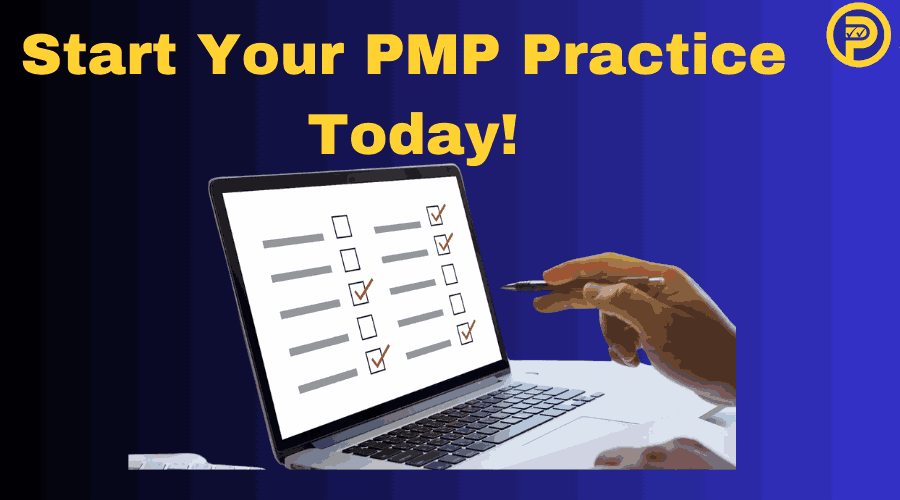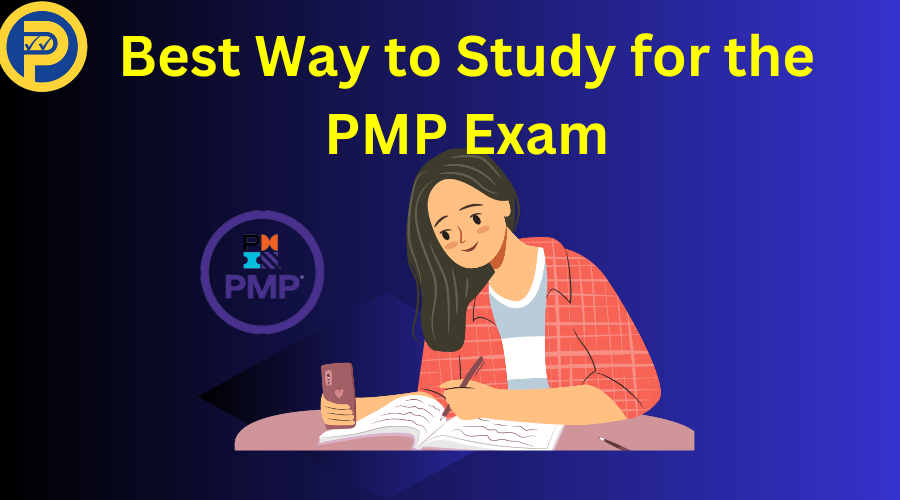The Project Management Professional (PMP) certification is your gateway to joining an elite group of project managers recognized for their expertise across industries. To succeed, finding the best way to study for the PMP exam is essential, ensuring you’re well-prepared to earn this prestigious qualification and advance your career.
Offered by the Project Management Institute (PMI), the PMP certification exam is a globally recognized credential that validates your project management skills. Earning this globally respected certification can lead to exciting career opportunities and higher salaries. You can apply for the PMP exam online.
But let’s not sugarcoat it: the PMP exam is no walk in the park. With its rigorous questions and real-world scenarios, preparation is key. Whether you’re new to project management or a seasoned professional, this practical guide below will show you the best way to study for the PMP exam.
Top Tips for PMP Certification Exam Preparation
Preparing for the PMP exam requires a game plan. Below, we’ll explore some effective strategies to boost your chances of passing the PMP certification exam. From mastering the PMBOK® Guide to leveraging practice exams, these tips will put you on the fast track to PMP certification.
You can pass the PMP certification exam with good PMP study resources. This guide will walk you through the best ways to prepare for the PMP exam. Ready to take the first step to becoming a project manager? Worry no more, we have you covered!
Develop a PMP Exam Study Strategy
The first step to success is creating a solid PMP study strategy. Think of it as your project charter—it outlines what you need to do and when.
- Assess Your Timeline: Determine how much time you can dedicate daily to studying. Most candidates spend 8–12 weeks preparing.
- Break It Down: Divide your study time by PMP domains (People, Process, and Business Environment). Focus more on high-weight areas.
- Mix Learning Methods: Combine reading, watching videos, and hands-on exercises to reinforce your understanding.
- Stick to a Routine: Dedicate specific times for studying, just as you would for managing a project.
- Track Your Progress: Use checklists or study apps to stay organized and motivated.
With a clear strategy, you’ll avoid feeling overwhelmed and make steady progress.
Get Familiar with the PMBOK® Guide Sixth Edition: All You Need to Know
The PMBOK® Guide Sixth Edition is your primary resource to prepare for the PMP exam. Here’s why it matters:
- What’s New
This latest version of PMBOK® Guide edition emphasizes agile and hybrid methodologies, recognizing the growing need for flexibility in today’s project environments. It also updates terminology and tools to align with modern project management trends.
- Why It’s Important
The PMBOK® Guide forms the basis of the PMP exam. It outlines the 49 processes, their interactions, and the tools and techniques essential for project success. The agile practice guide and familiarity with its content are important for interpreting questions and applying knowledge effectively during the exam.
How to Use PMBOK® Guide Effectively
- Master the five process groups: Initiating, Planning, Executing, Monitoring and Controlling, and Closing.
- Focus on the 10 knowledge areas, such as Risk Management, Schedule Management, and Stakeholder Management.
- Understand the ITTOs (Inputs, Tools, and Techniques, Outputs) for each process—they’re integral to solving complex exam questions.
- Use summaries, charts, and cheat sheets to simplify your revision.
Take Online PMP Test Prep Course
Online PMP test prep courses are a flexible and convenient way to study. These courses typically include access to comprehensive PMP notes and practice PMP exams. These notes offer clear and simplified explanations of PMP concepts and domains, making it easier to understand complex topics.
These mock exams not only assess your understanding but also help you identify weak areas and improve. Building confidence through consistent practice ensures you’re ready to tackle and pass the exam with ease and precision!
Prepsaret is the best provider of online PMP test prep courses, offering comprehensive notes and access to practice exams that equip you with all the knowledge areas, and skills needed to succeed on the PMP certification exam.
Test Your Knowledge with the PMP Practice Exam
Taking PMP practice exams is one of the smartest strategies to prepare for the real test. This practice test is carefully designed to replicate the actual exam’s format, level of difficulty, and time constraints, offering a realistic experience.
What Are PMP Practice Exams?
PMP practice exams are mock exams that mirror the structure and challenges of the actual PMP exam. They cover all domains, test your understanding of concepts, and prepare you to tackle real-world scenarios.

Benefits of Taking PMP Practice Exams
- Identify Weak Areas: Pinpoint the topics or processes that need more attention in your study plan.
- Boost Confidence: Gain familiarity with the exam structure, which helps alleviate anxiety on test day.
- Enhance Time Management: Practice pacing yourself to complete the exam within the specified time.
- Reinforce Knowledge: Solidify your understanding of project management principles by applying them in practical scenarios.
- Track Progress: Monitor your improvement with each test to ensure you’re moving closer to your goal.
How to Use Practice Exams Effectively
Commit to taking at least three full-length practice exams to simulate the real exam experience. Treat each session as if it’s test day—no interruptions, timed conditions, and complete focus.
Once finished, thoroughly analyze your results. Identify patterns in incorrect answers, revisit those areas in the PMBOK® Guide, and adjust your study strategy accordingly.
You can also use free PMP practice test questions for PMP exam preparation. These free sample questions help familiarize you with the exam format and assess your knowledge.
PMP exam prep resources involve practice PMP exams that not only test your knowledge but also build the confidence and skills necessary to ace the PMP exam. The more you practice, the more prepared and calm you’ll feel when the big day arrives!
e. Study Using Easy-to-Understand PMP Notes
Simplified PMP exam prep notes are a game-changer for preparation, breaking down complex topics and situational questions into easy-to-digest content. Choose notes that:
- Cover all PMP domains thoroughly and clearly.
- Provide sample quizzes at the end of each section for quick review.
These notes offer clear and simplified explanations of PMP concepts and domains, making it easier to grasp complex topics. They break down the essentials, helping you to prepare for and pass the exam more effectively.
Concise, well-organized notes help you focus on essential concepts without getting lost in unnecessary details. They streamline your study process, making it easier to retain information and reinforce what you’ve learned. Pair these notes with consistent practice questions to build a strong foundation and confidently tackle the PMP exam!
f. Participate in PMP Study Groups and Discussion Forums
Participating in PMP study groups and discussion forums is one of the best ways to prepare for your PMP exam. Studying with others can significantly enhance your motivation and provide fresh perspectives on challenging material.
By joining PMP study groups on platforms such as LinkedIn, Reddit, or Facebook, you can connect with fellow learners who share your goals.
Advantages of PMP Study Groups
- Resource Sharing: PMP Study groups allow members to exchange valuable resources and study tips, enriching everyone’s learning experience.
- Concept Discussions: Engaging in discussions about difficult concepts can deepen your understanding and clarify doubts.
- Insights from Experiences: Learning from the experiences of others can offer new strategies and approaches that you might not have considered.
- Reduced Isolation: Collaboration fosters a sense of community, making the study process more engaging and less isolating.
Participating in PMP study and discussion groups not only enhance your knowledge but also build a supportive network that encourages accountability and growth. Collaboration makes studying less isolating and more engaging! Join Facebook PMP study group now!
g. Leverage Your 35 Contact Hours for Project Management Training Wisely
The 35 contact hours needed for PMP certification eligibility serve as more than just a requirement—they’re a crucial stepping stone in your project management journey. These hours provide essential education and practical knowledge that will serve you throughout your career.
When selecting your training program, focus on two key criteria. First, ensure it comprehensively covers all PMP knowledge domains. This provides you with a well-rounded understanding of project management principles and methodologies.
Secondly, look for resources or a program that incorporates real-world case studies and practical examples. This hands-on approach helps bridge the gap between theory and actual project scenarios you’ll encounter.
Make the most of these training sessions by actively engaging with the material. Take detailed notes, participate in discussions, and ask questions when concepts aren’t clear. The knowledge gained during these hours will enhance your effectiveness as a project manager and serve as valuable PMP exam prep.
Remember, while accumulating these hours of project management might seem like just another box to check, they represent a valuable opportunity to build a strong foundation in project management best practices.
h. Instructor-Led PMP Training
Instructor-led training provides personalized support that’s particularly helpful when preparing for the PMP certification. Working directly with experienced trainers creates an optimal learning environment where complex project management concepts become more accessible and practical.
These seasoned professionals excel at breaking down challenging topics into digestible components, making it easier to grasp sophisticated project management methodologies and frameworks.
Their ability to share relevant real-world scenarios helps illustrate how theoretical concepts apply in actual project situations, bridging the gap between knowledge and practical application.
Advantages for Instructor-Led PMP Training
- Logical Progression: Instructor-led courses follow a self-paced and systematic structure, allowing learners to build knowledge step by step while providing opportunities for questions and discussions.
- Interactive Environment: The format encourages immediate clarification of doubts and fosters deeper understanding through peer learning and shared experiences.
- Organized Learning: This method is ideal for those who thrive in structured environments with set schedules and direct feedback from instructors.
- Enhanced Motivation: Regular interaction with instructors and peers helps maintain motivation and keeps learners on track toward their certification goals, making it a great option for those who prefer face-to-face instruction.
How Long to Study for the PMP Certification Exam
Determining how long to study for the PMP exam depends on your current knowledge and experience in project management. According to PMI’s exam preparation statistics, successful PMP candidates typically spend 60-120 total study hours preparing for the exam.
Based on survey data from recent PMP holders, an optimal exam date study schedule spans 8-12 weeks, dedicating 2-3 hours daily for PMP exam preparation. There are PMP exam dates available throughout the year.
The Project Management Institute (PMI) conducts the exam continuously, allowing PMP exam takers to choose their preferred date based on availability at Pearson VUE test centers. After your application is approved and the exam fee is paid, you can schedule your exam at a convenient time.
Research shows that candidates who maintain consistent daily study habits have a 15-20% higher pass rate compared to those who study irregularly. Around 85% of successful test-takers report that spreading their preparation across 2-3 months helped them better retain information compared to cramming.
Using our PMP practice exam can greatly shorten your study time, enabling you to prepare more efficiently in fewer days. These tests help you focus on essential concepts and identify areas that need improvement, ensuring a deeper understanding of all the material. Make the most of your study time with our effective practice exam!

PMP Exam Day Preparation
A well-structured approach to exam day can significantly impact your performance on the PMP certification test. Here’s a comprehensive guide to ensure you’re fully prepared and confident when entering the testing center.
Pre-Exam Essentials
- Review the testing center’s location and parking options 24-48 hours before your exam
- Prepare required identification documents (two valid forms of government-issued ID)
- Pack permitted items like a light jacket or sweater
- Plan to arrive 30 minutes in a classroom setting before your scheduled time
Keep Your Anxiety in Check
Manage test anxiety through proven techniques:
- Practice deep breathing exercises (4-7-8 breathing method)
- Visualize successful test completion
- Get adequate rest the night before (7-8 hours recommended)
- Maintain a positive mindset by reviewing your preparation accomplishments
Technical Knowledge Review
Focus on these critical areas during your final review:
- Process Groups and their interactions
- Key project management documents and their purposes
- Essential formulas (EVM, CPM, TCPI)
- Common project management terms and definitions
Exam Structure Familiarity
Understanding the exam format builds confidence:
- 180 questions to complete in 230 minutes
- Multiple question types (multiple-choice, matching, hotspot)
- Optional 10-minute break after question 90
- No penalty for wrong answers
Why Study with Prepsaret for Your PMP Exam
Studying for your PMP exam with Prepsaret offers a comprehensive and self-paced approach to preparation. Their PMP test prep course provides a range of options tailored to your needs, including access to exact PMP mock exam questions with detailed explanations.
Additionally, you benefit from easy-to-understand notes that simplify complex concepts. All the materials, including practice exams and notes, are accessible online, allowing you to study at your convenience. This flexibility ensures you can fit your studies into your busy schedule while receiving quality content that enhances your understanding and confidence.
FAQs
How Long Should You Study for the PMP Exam?
The duration of study for the PMP exam typically ranges from 2 to 4 months, depending on your existing knowledge and availability. Most candidates dedicate around 70-85 hours of focused study time, breaking it down into manageable weekly study sessions, to reinforce learning and ensure retention of key concepts.
Can I Study for PMP on My Own?
Yes, you can study for the PMP certification exam online on your own! Many candidates successfully prepare for the exam independently by utilizing study materials, online PMP exam prep course, and practice exams.
However, joining study groups or forums can provide additional support and motivation throughout your preparation journey.
Is 70% Enough to Pass PMP?
A score of 70% is generally considered the minimum passing mark for the PMP exam. However, it's essential to focus on mastering all the materials rather than solely aiming for this final score, as understanding key concepts is crucial for success in real-world project management scenarios.
Start your PMP Exam Preparation Journey Now!
Start your PMP exam preparation with Prepsaret! Our practice exams help you build essential project management skills, boost confidence, and increase your chances of success. Each practice question brings you closer to passing the exam. Trust the process—you’ve got this! Start today and set yourself up for success.

